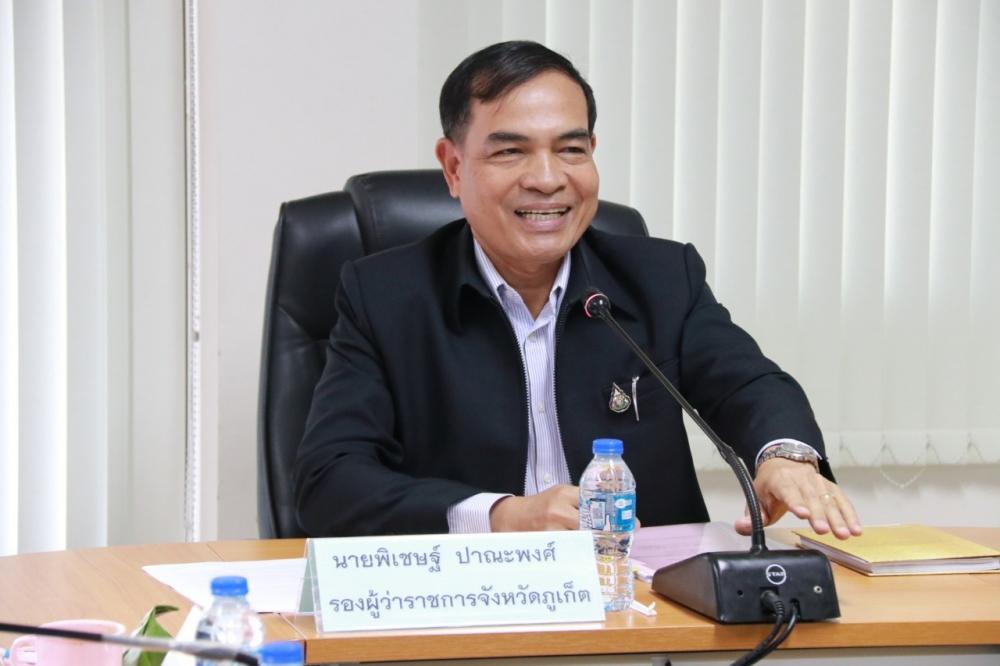
The Covid-19 pandemic continues to cripple the vital tourism sector, with several provinces that rely on tourism revenue suffering the most. The southern resort province of Phuket is hit particularly hard due to its reliance on foreign visitors.
Deputy Phuket Governor Pichet Panapong, who is a major player in the country's economic rehabilitation efforts, told the Bangkok Post about Phuket's plan to revive the province.
In the short term, the province plans to organise activities under the government's "Thai Thiew Thai" (Thais Travel Thailand) campaign, he said.
Village health volunteers and personnel of sub-district health promotion hospitals have travelled to Phuket under the campaign, starting on Aug 1.
Around 50,000 more are expected in the next three months, and general Thai travellers in the near future.
One of the highlights of short-term efforts to kickstart the economy is an event called Phuket Tastival Seafood & Gastronomy planned for various locations across the province.
The event will feature booths by local producers, restaurants and hotels with outdoor seating on the beach.
The grand gastronomic fair is expected to draw thousands in each of its six instalments.
As Phuket tourism has started to pick up, the provincial administration hopes to expedite the recovery by calling on tourism services, such as transport services, to give tourist discounts.
The administration would ensure fares comply with regulations, the deputy governor said.
Regarding the so-called travel bubble scheme, the deputy governor said the provincial administration was considering this matter with the Centre for Covid-19 Situation Administration (CCSA).
Apart from foreign tourists, he said many hundreds of foreign students had expressed their wish to visit Phuket to study.
If the CCSA approved a travel bubble scheme, all foreigners travelling to Thailand must test negative for the Covid-19 in their country of departure and obtain permission to enter the kingdom from the Royal Thai Embassy.
They must also have health insurance with coverage of US$100,000 (3.1 million baht) and spend two weeks in quarantine once they arrive on the island.
The deputy governor said the most important thing was that Phuket must make local people feel confident in the safety of travel bubble agreements.
The provincial administration must also make it clear how it would respond in the case of local transmission if foreigners were allowed in.
The saying that "you either die of the Covid-19 or of hunger" now seems to ring true in many corners of Thailand and Phuket is no exception.
Job creation has never been so urgent on the island where unemployment was less than 2% from 2007–2016.
"We want to urgently hire people who have been affected by Covid-19," he said. "They will be hired to collect data to be used for future development of Phuket in various areas.
"Five hundred people will be hired first for six months with a wage of no less than 15,000 baht per person."
In the long run, the provincial administration plans to use the strength of Phuket as a centre of industry. This encompasses businesses working in agriculture, gastronomy and seafood.
Setting up a seafood central market and marinas is part of a long-term plan to shake up the province's economy and wean it off its dependency on tourism.
However, it does not mean that Phuket will shy away from the tourism sector, but that Phuket tourism in the Covid-19 era will focus on health and wellness instead.
"Phuket's location can be used as a selling point of a medical plaza project which will feature a long-term care centre for foreign patients with serious illnesses and nursing homes. Foreign patients can come here for treatments and travel at the same time," he said.
The medical plaza will be located on an area of over 170 rai on the scenic and peaceful Mai Khao beach. it was unclear who would develop it. But Mr Pichet said the government and private sector need to work together to help make the plans "come true".
He discouraged non-constructive feedback while suggesting all sides should inform themselves of the province's efforts so no one will be left behind. "Let's work together to develop new industries in Phuket in line with our strategic standpoint.
"I believe the government will give us time, but what is important is that we move in the same direction and make sure there will be no objection," he said.
The Prince of Songkla University Phuket Campus has assessed the cost of economic damage from Covid-19 in Phuket and said the total could reach up to 120 billion baht. "The most visible damage in Phuket is unemployment. Businesses are allowed to reopen but they still refuse to be open since there are still no tourists," Mr Pichet said.
"Everyone suggests that hotels, tourist sites and other tourism-related businesses take Thai tourists first, but at the same time we are preparing to welcome foreign tourists back to help restore the economy."
